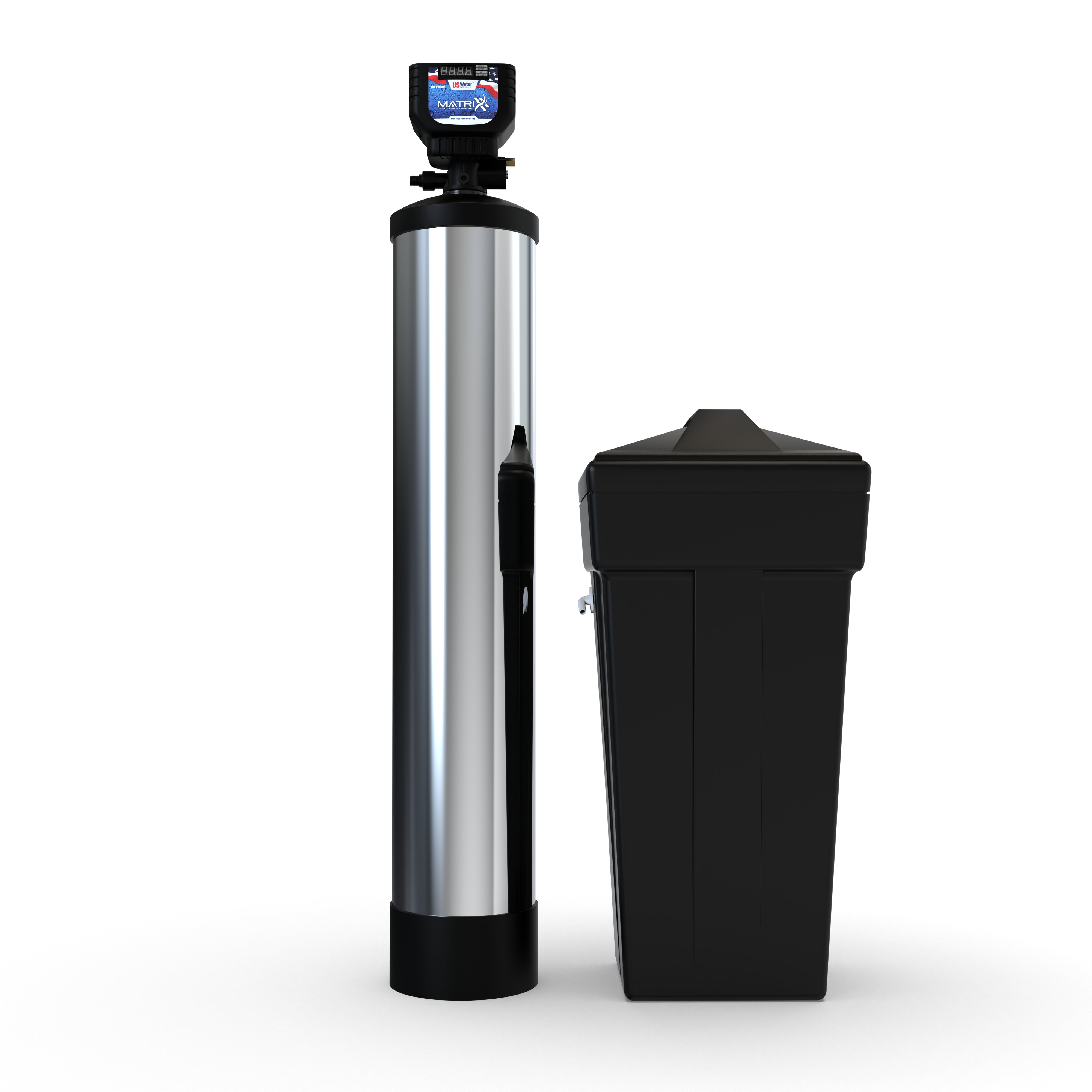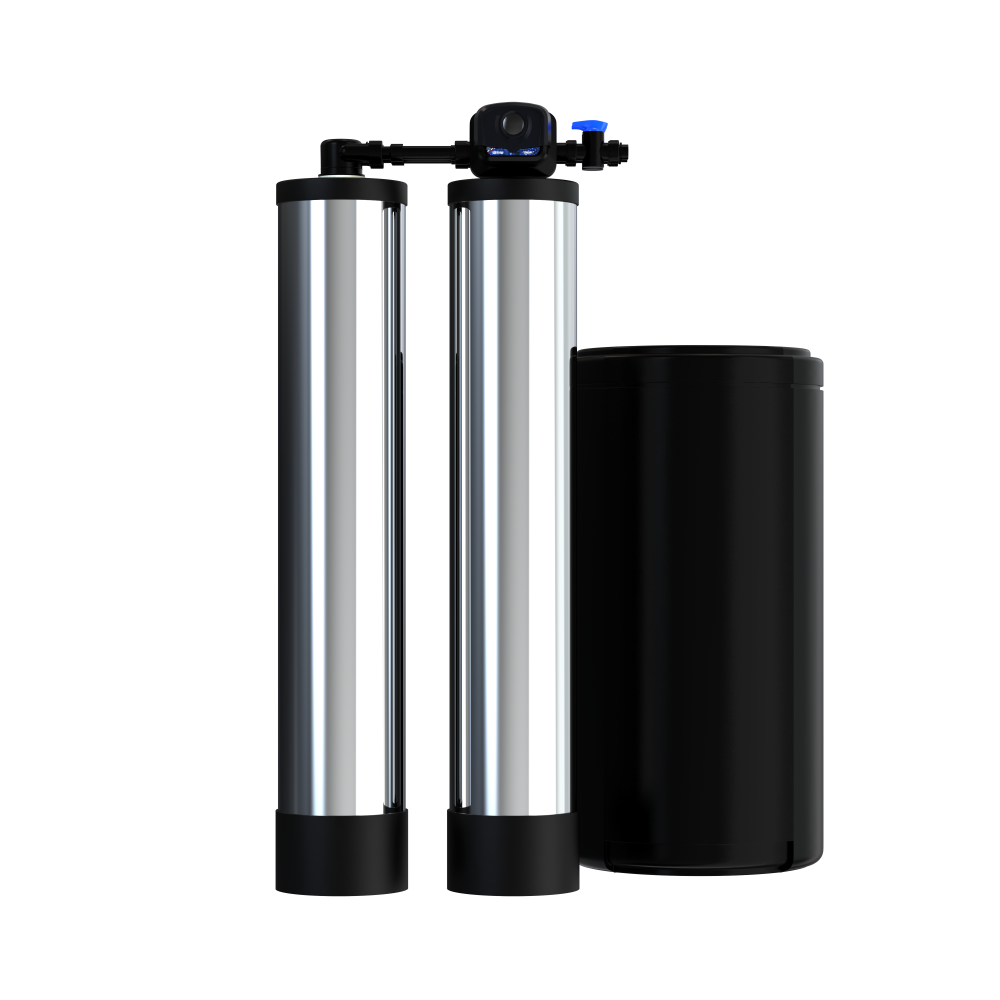Whole House Water Softeners
-
Matrixx Smart Metered Water Softener
US Water Systems Matrixx Smart Metered Water Softener - 1”Flow/20 GPM Discover the Matrixx Smart Water Softener, a seamless blend of industry-leading technology and efficiency in water treatment. Engineered to accommodate high demands, the Matrixx delivers an astounding flow rate of up to 20...- From $1,295.00
$2,158.34- From $1,295.00
- Unit price
- per
-
GreenWave Salt-Free Water Softener Alternative
America's #1 Choice in Salt- Free Water Conditioning Traditional salt-based water softeners remove the minerals that make water hard, mainly calcium and magnesium. The GreenWave on the other hand neutralizes these minerals, preventing them from adhering to surfaces, this effectively prevents the negative effects...- From $1,550.00
$3,325.00- From $1,550.00
- Unit price
- per

Matrixx Smart Metered Water Softener
A leap forward in eco-friendly water treatment. This revolutionary system, powered by advanced smart valve technology, ensures maximum efficiency whether using salt or potassium.
- Limited lifetime warranty with 10 years on the electronic valve
- One-touch programming and smartphone integration with free Legacy View app
- EcoSmart backwashing for minimal water waste
- Up to 70% savings on salt consumption
- Energy savings of up to 40% and cleaning products savings up to 50%
- Bluetooth 5.0 enabled smart valve system for real-time water usage tracking
- Premium 10% crosslinked Ion Exchange Resin
- Low voltage design and battery backup to ensure uninterrupted service

Synergy Plus Twin Metered Water Softener
A game-changing solution for uninterrupted soft water supply. Engineered to regenerate with soft water brine, this product ensures you never waste a pound of salt and always have soft water at your disposal
- Twin-alternating mechanism for consistent 24/7/365 soft water
- 10-Year Warranty on valve and electronics and Limited Lifetime Warranty on Tanks
- Up to 50% savings on cleaning products and 30% on water heating
- Bluetooth 5.0 enabled smart valve system for real-time water usage tracking
- Designed for homes, small businesses, or water with iron content
- High Flow rates with minimal pressure drop
- Downloadable Waterlogix companion app for customized water hardness settings
Smart Valve Technology
We spent years developing a family of salt-efficient water softeners that integrate seamlessly with our free smartphone app. Simply download the free accompanying companion app, pair the devices, and you'll have access to a real-time dashboard and settings.

Carbon Neutral
By buying American-made products, you help reduce your carbon footprint.
Reduced Salt & Soap Consumption
Our water softeners use up to 75% less salt per regeneration when compared to our leading competitors. Oh and soap? With properly softened water you'll need about 50% less when it comes to cleaning.
Best Warranty In The Business
On our entry-level water softening systems we offer a 10-year tank warranty with a 7-year warranty on the electrics and valve. Our Matrixx water softener comes with a lifetime warranty on the tank and a 10-year warranty on the valve and electronics.
Water Softener FAQ
The first and most important reason to use a home water softener is to remove the hardness minerals from your water. Hard water clogs the plumbing and any water-based application that relies on the plumbing. With soft water, you will no longer need to worry about rising energy bills because your appliances are not working as well, or expensive repair costs. You will also benefit from longer-lasting clothing, detergents that work more effectively, and a clean feeling on your skin after a shower or bath.
Some plumbers argue that soft water is corrosive. This is a common myth. Water softened by a water softener is no more corrosive than hard water. The most practical downsides of a water softener are extra monthly water usage from a water softener's regeneration function, and the maintenance of adding salt to the water softener.
Most softened water is safe for drinking. The amount of sodium that is added to your water from a water softener will depend on the amount of minerals in the water there were to begin with. As a rule of thumb, if your combined water hardness is less than 400 ppm (parts per million) then there is little concern with drinking the water.
Hard water contains minerals such as calcium and magnesium that can build up on your fixtures, pipes, appliances, and even your skin. A water softener replaces calcium and magnesium ions with sodium ions. Sodium is far less likely to bind to your skin. The addition of sodium content in the water is what gives the water the “slimy” or “silky” feeling… Depending on your predisposition.
A water softener can corrode the sacrificial anode rod in a tank style water heater faster than hard water may. Water, steel, and electricity do not play well together, regardless of water quality. Ultimately, water is a solvent and will erode anything in contacts, given enough time. In recent years anode rod technology has improved and there are numerous products that are far more corrosion resistant.
Hard water containing elevated levels of minerals such as magnesium and calcium can have a negative effect on your hair. Hard water can be detrimental to hair, making it dry, brittle, brassy, and dull. It can also cause scalp issues like flakiness and itchiness. Hard water can also inhibit the efficacy of many hair products. Soft water has a low concentration of minerals and can leave hair smoother and more manageable.
Well, that depends. It would depend on what type of plant, how often it needs watered, how hard the water is, and how much sodium there was to begin with. Because these variables are difficult to track and manage, we never recommend water plants with soft water. The presence of sodium chloride in softened water can accumulate in the soil and cause problems with plant growth. We recommend filtered tap water for watering plants.
It is very rare that somebody would taste soft water and think “wow, this is salty”. That is because the amount of sodium added to the water is directly proportional to the amount of minerals that were previously present in the water. If you are on city water and pay a water bill, odds are your palate would not be able to detect a salty flavor. If you get your water from a private well with incredible levels of mineral present, a water softener may result in a slightly salty taste, and that's if you have a uniquely sensitive palate.
Technically yes it can. In small amounts. Softeners can reduce or remove iron if the pH, hardness, and type of iron are all just right. Because there are so many variables to consider, it is not recommended to rely on a water softener to treat iron specifically. An iron filter is recommended to be installed ahead of a water softener. A typical iron filter employs a form of oxidation then a backwashing filter with a carbon-based substrate.






